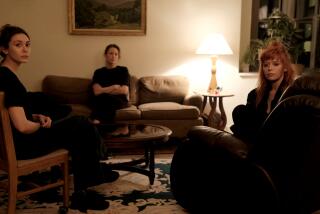Book review: ‘Every Last One’ by Anna Quindlen
Anna Quindlen is a good caretaker. In her new novel, “Every Last One,” she welcomes us into her fictional world with open arms. She is accomplished, sure-handed and sensitive to her reader’s needs — even a bit compulsive in her urge to make sure no nuance gets overlooked.
Quindlen conjures family life from a palette of finely observed details: the sound of the scraping of forks on Melmac plates, an angry teenager’s footfalls. “The sound Ruby’s feet make on the stairs is the window of her soul,” she writes. We fall into this novel as if it were an easy chair, comforted by a writer who knows her craft.
At the center of “Every Last One” is Mary Beth Latham: mother of twin teenage boys with contrasting personalities and a high-achieving, college-bound daughter; wife of a supportive, if slightly dull, husband. The family lives in Vermont surrounded by a community that both nurtures and vexes them.
Mary Beth is a multi-tasking, mood-reading, car-pooling, landscaping, square-meal-cooking dynamo. She plants bulbs in the fall, trims other people’s Christmas trees and makes time for marital sex, all the while beating back waves of maternal guilt crested with encroaching midlife despair.
It is a life both familiar and oddly glossy, like a spread from the pages of Real Simple magazine. Sure, there’s mess and clutter, but Mary Beth has it neatly compartmentalized into colorful bins.
In her “up” moments, Mary Beth finds creative ways to strong-arm the relentless march of time. “You can look at the pin oak in a front yard, or even the daffodils you put in the autumn before, and know that long after you are gone there will be shade, and color,” she reflects.
But this optimistic long view often gives way to creeping angst. “I am so middle-ground these days,” she tells us, “that it seems impossible to believe, but I suppose that is the progression: the sharp edges of youth ground down by life. A razor becomes a knife becomes a paperweight.”
Herein lies the problem with “Every Last One”: Even in the face of mind-shearing events, Mary Beth remains a paperweight to the very end.
This is Quindlen’s sixth novel, and she knows how to build the armature of a story. Yet even as the Lathams become tenderly real to us, Quindlen fails to develop the necessary narrative urgency.
She is great at tracing the love-me/leave-me-alone vicissitudes of teenagers: “It’s as though she has outgrown the need to oppose me, which I fear is only a few beats away from outgrowing me entirely. Sometimes I feel as though the entire point of a woman’s life is to fall in love with people who will leave her.”
She is also sharp in describing the sweet boredom of marriage, the pitfalls of competitive parenting and the ennui of suburban life.
Quindlen, though, is so focused on detail, the larger picture fails to emerge.
This is a problem in a novel that seeks to tell us something not just about a family but also about the dangers that swirl around them, unrecognized.
There are whispers, glimmers: Mary Beth comes downstairs one night to find her daughter comforting a bruised, weeping girlfriend. The girl has leaves and twigs in her hair, and like Mary Beth, we are desperate to know what has happened.
Two days later Mary Beth discovers that one of her landscaping projects has been vandalized. But that turns out to be a MacGuffin, making us wonder why Quindlen took the time to work it in.
Conflict-hungry readers will spot the looming peril that Mary Beth refuses to see in her daughter’s ex-boyfriend, a troubled boy who has grown up on the sidelines of her family, insinuating himself into the fold.
When he finally snaps, midway through the book, the resulting tragedy is catastrophic and fierce. The novel abruptly shifts from a story of everyday valor to one of valor in the face of excruciating grief.
And yet, if some kind of epiphany is called for, instead we get a shopworn reckoning with bereavement, like something out of Kübler-Ross.
“How come you don’t ever cry?” Mary Beth’s mourning son asks her during a therapy session. “You act like nothing happened. We’ll get a new house and new furniture and then we’ll act like everything’s fine.”
Mary Beth delivers the asked-for tears and then staunchly fulfills her son’s prophecy. She relocates her colored bins and patches a new life together, holding up, being strong, planting bulbs — and remaining essentially unchanged.
“You’ve lost yourself,” her best friend says at the beginning of “Every Last One,” the implication being that motherhood necessarily supplants a woman’s unique identity.
But if this suggests that there is some truer Mary Beth beneath the surface, all Quindlen ever gives us is the same forbearing woman with whom we started out. We are denied not just her grieving but her rage.
Mary Beth remains hyper-aware but deeply unconscious, with no greater sense of herself.
“I am trying,” she concludes. “It’s all I know how to do now. I am trying.”
Schickel is the author of “You’re Not the Boss of Me: Adventures of a Modern Mom.”
More to Read
The biggest entertainment stories
Get our big stories about Hollywood, film, television, music, arts, culture and more right in your inbox as soon as they publish.
You may occasionally receive promotional content from the Los Angeles Times.










